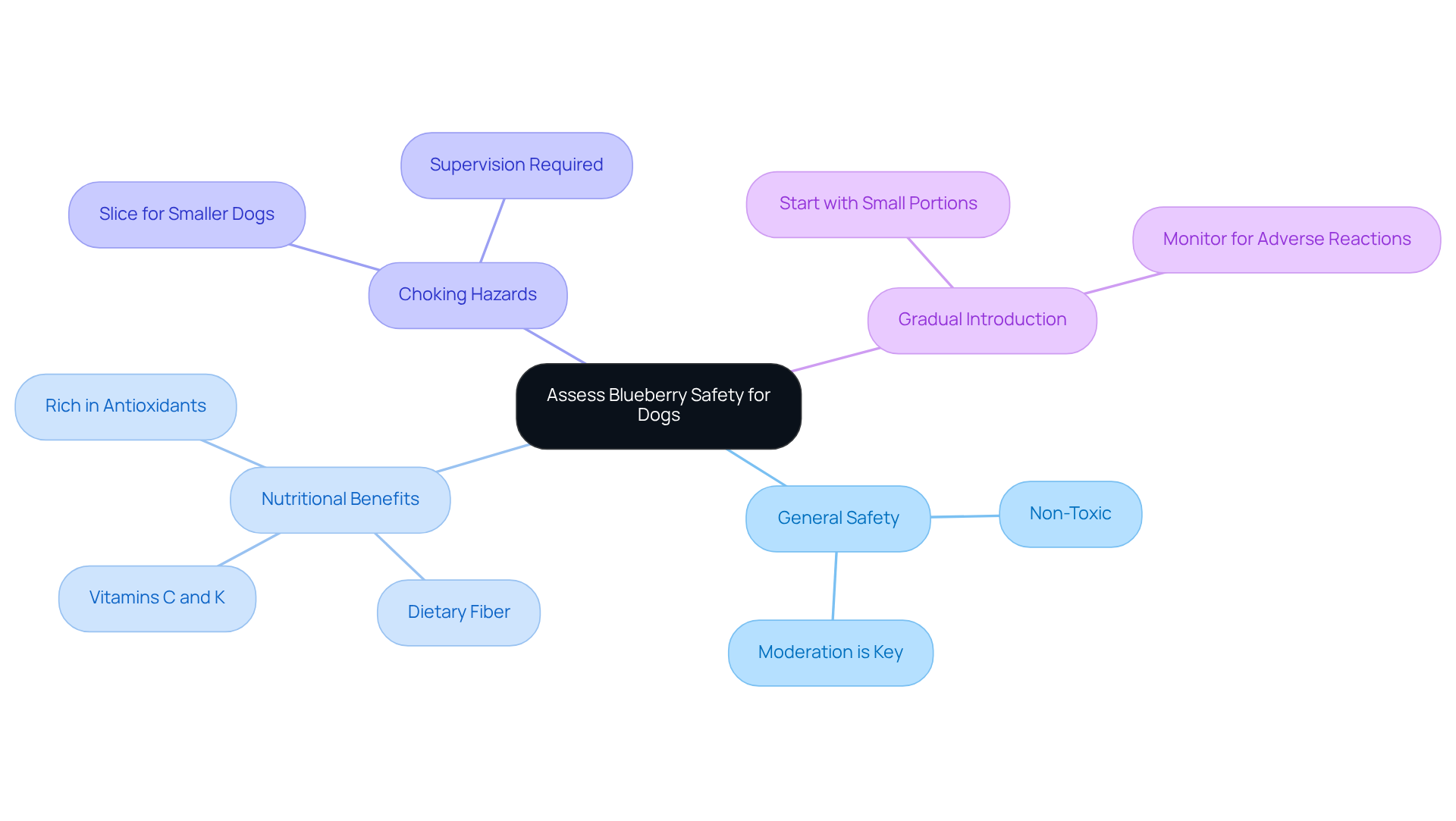
Are Blueberries Good for Dogs? Discover the Benefits and Risks
Overview
As a loving pet owner, you want to ensure your furry friend enjoys a healthy and happy life. Blueberries can be a delightful addition to your dog’s diet, offering a wealth of antioxidants, vitamins, and dietary fiber. However, it’s important to remember that moderation is key. While these little fruits are non-toxic and beneficial, keeping an eye on your dog’s reactions is essential to ensure their well-being.
Imagine the joy of watching your dog savor a blueberry treat. Yet, alongside that joy, there are concerns about choking and gastrointestinal issues that can arise if not monitored. By taking simple precautions, you can allow your dog to relish this nutritious fruit while safeguarding their health. Remember, your attentiveness plays a vital role in their enjoyment and safety.
Incorporating blueberries into your dog’s diet can be a wonderful way to enhance their health, but always approach it with care. By staying informed and attentive, you can create a nurturing environment where your dog can thrive and enjoy the benefits of this tasty treat.
Introduction
The vibrant blueberry, often lauded for its numerous health benefits, prompts an essential question for devoted dog owners: are these delightful little fruits safe and beneficial for our beloved companions? Rich in antioxidants and vital vitamins, blueberries can indeed enrich a dog’s diet, providing a tasty and nutritious treat. Yet, amidst these advantages, it’s important to approach with care, as improper serving sizes may pose choking hazards or digestive troubles. As caring pet owners strive to offer the very best for their furry friends, grasping the delicate balance between enjoyment and safety becomes paramount. So, how can we thoughtfully navigate the enchanting yet intricate world of sharing blueberries with our dogs?
Assess Blueberry Safety for Dogs
As pet owners, we always want to ensure our furry friends are safe and healthy. Many people wonder if blueberries are good for dogs, and they are generally regarded as safe for our beloved canines to enjoy. According to several veterinary references, including the American Kennel Club and PetMD, they confirm that blueberries are good for dogs, as these delightful berries are non-toxic and can be a nutritious addition to a dog’s diet when provided in moderation.
However, it’s important to be mindful of potential choking hazards, especially for our smaller breeds. To keep our pets safe, it’s wise to supervise them while they indulge in these berries and to slice them in half for smaller dogs to minimize risks.
Introducing any new food can be a bit nerve-wracking, and it’s best to do so gradually. This way, we can monitor our pets for any adverse reactions, such as allergies or digestive issues. By taking these precautions, we can ensure that our dogs enjoy blueberries as a safe and healthy snack, which raises the question: are blueberries good for dogs? Remember, these small fruits can bring joy to our pets’ lives when we follow appropriate measures, allowing us to share delightful moments together.

Identify Nutritional Benefits of Blueberries
Blueberries are truly a wonderful superfood, cherished for their remarkable nutritional benefits. They are packed with antioxidants, particularly anthocyanins, which play a vital role in combating oxidative stress. This could help lower the risk of chronic illnesses in our beloved canine companions, leading to the inquiry of whether are blueberries good for dogs. Additionally, these delightful berries are a fantastic source of dietary fiber, which supports healthy digestion and can aid in weight management. They are also rich in essential vitamins, like Vitamin C, which boosts immune function, and Vitamin K, crucial for maintaining strong bones. Given their low-calorie count, many pet owners wonder, are blueberries good for dogs, as they make an ideal snack, especially for those striving to maintain a healthy weight.
It’s important to remember that treats should only make up about 10% of a dog’s daily caloric intake; small dogs can enjoy 2-3 berries daily, while larger dogs can safely indulge in up to 10. Incorporating these small, dark fruits into your dog’s diet can help you determine if are blueberries good for dogs, while also providing a tasty and nutritious enhancement to their overall health. However, moderation is key, as overindulgence can lead to digestive issues or even choking hazards. Always wash the berries well to remove any pesticides before sharing them with your furry friend.
For a fun twist, consider making homemade treats by mixing the fruit with xylitol-free yogurt or whipping up no-bake oatmeal bars. And remember, it’s always wise to consult with your veterinarian before introducing new foods to your pet’s diet.

Evaluate Risks and Precautions of Blueberry Consumption
While these small berries offer numerous health benefits, it’s important to acknowledge some risks associated with their consumption, particularly when asking, are blueberries good for dogs?. One significant concern is the potential for choking, especially in smaller dogs or those that tend to gulp their food. To ease your worries, consider cutting these fruits in half or mashing them before feeding.
Additionally, consuming too many of these berries can lead to gastrointestinal discomfort, such as diarrhea or an upset stomach, due to their high fiber content. Therefore, moderation is key; blueberries should make up no more than 10% of your pet’s daily calorie intake. Serving sizes vary by size:
- Small pets can enjoy 2-3 blueberries
- Medium pets 3-5
- Large pets up to 10
It’s also essential to be vigilant for any signs of allergies, such as vomiting or excessive scratching, and to consult a veterinarian if any adverse reactions arise. As emphasized by the Warrick Veterinary Clinic, discussing dietary changes with a veterinarian is crucial for ensuring your pet’s well-being.
Furthermore, it’s wise to avoid feeding wild berries to dogs due to the risk of toxicity. By being mindful of these precautions, you can safely incorporate these delightful fruits into your dog’s diet, and this raises the question: are blueberries good for dogs in helping to foster their health and happiness?.

Incorporate Blueberries into Your Dog’s Diet
Including small berries in your dog’s diet raises the question of whether blueberries are good for dogs, as they can be both enjoyable and nutritious, and it’s important to consider how we nurture our furry friends. Here are some creative ways to serve them that not only delight but also contribute to their well-being:
- Fresh Treats: Providing fresh, washed fruit as a standalone snack can be a simple joy for your dog. Always check for mold or signs of aging before feeding, and start with a small quantity to monitor your dog’s reaction. This mindful approach shows your love and care.
- Combined with Food: Enhancing your dog’s standard kibble or wet food by incorporating a few berries can improve both taste and nourishment. For portion control, larger dogs can enjoy 8-10 berries, while smaller dogs should have fewer. This small addition can make mealtime even more special.
- Homemade Snacks: Creating dog snacks using blueberries mixed with wholesome ingredients like whole wheat flour, oats, and peanut butter offers a nutritious option that you can feel good about. It’s a wonderful way to bond with your pet through homemade treats.
- Frozen Snacks: Freezing small berries can create a refreshing treat, perfect for those hot days when your dog needs something cool and delightful.
- Smoothies: Blending blueberries with yogurt or other dog-safe fruits allows you to whip up a nutritious smoothie that your dog will love. It’s a fun way to incorporate healthy ingredients into their diet.
Always introduce new foods gradually and in moderation to support your dog’s digestive well-being. It’s important to consider if blueberries are good for dogs, given that they are rich in antioxidants which can help prevent cancer and support overall health. By creatively incorporating blueberries into their diet, you can enhance their nutrition while also addressing whether blueberries are good for dogs, providing a delightful treat that shows your commitment to their happiness and health.

Conclusion
Blueberries can be a delightful and nutritious addition to a dog’s diet, providing numerous health benefits when introduced safely and in moderation. It’s heartening to know that these small berries are generally safe for canine consumption, offering essential vitamins, antioxidants, and dietary fiber that contribute to overall well-being. However, it’s important to approach their introduction thoughtfully, ensuring that pet owners remain vigilant about potential risks such as choking hazards and gastrointestinal discomfort.
This article highlights the various nutritional benefits of blueberries, including their role in combating oxidative stress and supporting digestive health. It emphasizes the importance of moderation, with specific serving sizes tailored to a dog’s size. Additionally, there are creative ways to incorporate blueberries into a dog’s diet, such as:
- Fresh treats
- Homemade snacks
- Smoothies
showcasing the versatility of these fruits as a healthy snack option.
Ultimately, the key takeaway is that blueberries can indeed be a beneficial treat for dogs when provided with care and attention. Pet owners are encouraged to consult with their veterinarians before making dietary changes and to monitor their pets for any adverse reactions. By integrating blueberries into their dogs’ diets responsibly, pet owners can enhance their companions’ nutrition and foster joyful moments together, reinforcing the bond between them and their furry friends.
